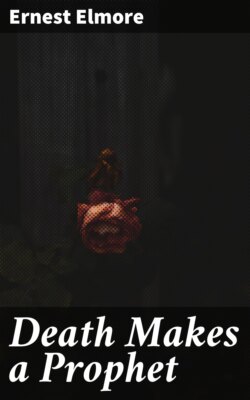Читать книгу Death Makes a Prophet - Ernest Elmore - Страница 5
На сайте Литреса книга снята с продажи.
I
ОглавлениеTable of Contents
“An Englishman, as a free man,” said Voltaire, “goes to heaven by the road which pleases him.” If there are many roads that lead to perdition, then there are as many that lead to salvation; and England probably houses more diverse, odd and little known religions than any other country in the world. And of all places in this island most conducive to the flourishing of these many beliefs, none can equal the little town of Welworth. Welworth is not an ordinary town. It is that rarefied, mushroom-like, highly individualistic conglomeration of bricks and mortar known as a Garden City. There is no house in Welworth over thirty years old. There are no slums, monuments, garden-fences, bill-hoardings or public-houses. There is a plethora of flowering shrubs, litter-baskets, broad avenues, Arty-Crafty Shoppes, mock-Tudor, mock-Georgian, mock-Italianate villas. There is, of course, a Health Food Store selling Brazil Nut Butter, cold spaghetti fritters, maté tea and a most comprehensive and staggering range of herbal pills and purgatives. Per head of the population, Welworth probably consumes more lettuce and raw carrot than any other community in the country. A very high percentage of the Welworth élite are not only vegetarians, but non-smokers, non-drinkers and non-pretty-well-everything-that-makes-life-worth-living for less high-minded citizens.
They weave their own cloth, knit their own jumpers and go their own ways with that recherché look common to all who have espoused the Higher Life. Many favour shorts and open-work sandals. A large number do barbola-work or dabble in batik. Some are genuine, some are not; but all bear with them the undeniable stamp of individuality and burn with the unquenchable fire of their particular faith. It may be Theosophy or Babaism; it may be Seventh Day Adventism, Christian Science, Pantheism or what you will—but in a naughty world full of atheists and agnostics, Welworth is a refreshing centre of spiritual élan and a complete refutation of the theory that sectarianism in this country is on the wane.
It is claimed (with all due deference to Mr. Heinz) that there are fifty-seven varieties of religion in Welworth. It speaks highly of the town’s tolerance. Some are orthodox. Some are unorthodox but well known. Others are unorthodox and unknown. And among the latter, probably the least orthodox and the most exclusive, is that queer, somewhat exotic sect, founded by Eustace K. Mildmann in the early nineteen hundreds, called the Children of Osiris.
For the sake of brevity in a busy world, the Children of Osiris, adopting the initials of their full title, referred to their doctrine as the Cult of Coo, or more simply, Cooism. (Not to be confused, of course, with Coué-ism.) The gods of Cooism were those of Ancient Egypt—Osiris, Isis, Horus, Thoth, Set, and so forth—but this rich mythology had been modernised and modified by the inclusion of many dogmas borrowed from less remote religions. The result was a catholic hot-pot compounded of a belief in magic numbers, astrology, auras, astral bodies, humility, meditation, vegetarianism, immortality, hand-woven tweeds and brotherly love. It was, in short, an obliging religion because one could find in it pretty well anything one looked for. Eustace Mildmann found everything in it. It was his child, his passion, his whole life. He had created Cooism and because, before seeing the light, Eustace had been a nonentity, it might be said that Cooism had created Eustace Mildmann. It had lifted him out of a small provincial bookshop and set him down in Welworth with five elderly female acolytes, an enormous and contagious enthusiasm for his faith and a small overdraft at his bank. His sincerity was not to be doubted. Cooism to Eustace was the key to all life’s mysteries. It was the only straight road that led to salvation. He believed it could solve everything—even the overdraft at his bank. And like many men of unswerving belief he found his optimism justified. He found in Welworth an intellectual coterie ready and willing to listen to him. His five female acolytes soon became ten, fifteen, fifty zealots of both sexes. He found a small tin hall left by some improvident sect that had gone theologically and financially bankrupt. It became the first Temple of Cooism. And finally, like a Parsifal who at length discovers his Holy Grail, he found the Hon. Mrs. Hagge-Smith. After that Cooism, so to speak, was on the map.
